Strictly Personal
If we stop stealing $3b a year EU won’t lecture us over ‘a mere’ $2b by Joachim Buwembo
Published
2 years agoon

Ugandans are very angry at the Europeans. So angry that even children had to put their books aside to go and demonstrate at the European Union offices in Kampala.
The angry children carried placards and chanted slogans to remind the EU diplomats that Uganda is an independent country and giving it grants in millions of euros doesn’t mean it should be treated like a European colony.
It started with a resolution in the European Parliament calling for a halt on the East African Crude Oil Pipeline, hailed by ourselves as the longest heated oil pipeline in the world, which is to be constructed from Lake Albert at the DR Congo border in western Uganda all the way to the Indian Ocean at Tanga in Tanzania.
The European parliamentarians are concerned about those old things we have heard of for decades — like human rights and environmental abuses. Anyway, the government is firm that the pipeline shall be constructed, come rain, come shine.
For now, politicians and other leaders continue to “blast” and “lambast” those European busybodies who are forgetting “to mind their business” telling us about our environment, yet they have been extracting — unhindered — fossil fuels all over the world for a century. Anyway, if they thought we were a pushover, they are going to see what real African men are made of.
Are you wondering where these meddling Europeans get the audacity to lecture us about our internal affairs of human rights and the environment? It’s because of their money, which they give us in form of grants, and they can also influence our lenders. For a decade or two, we stopped worrying about their lectures after we discovered new friends in China, who do not ask us about the way we do our private things.
The Europeans are like the mean rich boy or girl in high school who lent you a pair of shoes for the school dance and chose to remind you to dance carefully lest you damage “my shoes”! The mean soul would say this at that critical point when your dancing partner was really admiring your dance strokes, thereby ruining your chances of having a meaningful follow-up conversation after the song.
But now we are in a difficult position. While the friendly Chinese are not interested in our private affairs before lending us money, they lend like commercial banks, because they actually lend through commercial banks. Their terms and interest rates are commercial and the consequences of default are not that sufferable at all.
However, we do not have to suffer this humiliation forever. There is a way out. What these people lend us as a country could be “a mere” $2 billion a year. But our Inspector-General of Government says that some $3 billion is stolen from our common pool every year. So, if we set our policemen and detectives to work and catch the people who steal the money and take it from them, we can actually give ourselves more than the foreigners lend us, right?
Okay, maybe it is not easy to squeeze all the money from them. Suppose we install serious internal audit measures and prevent the theft of $3 billion every year, we can deploy it to do those things for which we borrow. In that case, we don’t even have to spend money prosecuting people, looking for the money they stole, which could already have been spent or hidden in other countries. We just stop the theft and see how the Europeans will find the voice to lecture us, and how the Chinese will charge us high interest on their loans.
Joachim Buwembo is a Kampala-based journalist. E-mail: buwembo@gmail.com
You may like
-


This Sudan war is too senseless; time we ended it, By Tee Ngugi
-


Air Peace, capitalism and national interest, By Dakuku Peterside
-


This is chaos, not governance, and we must stop it, By Tee Ngugi
-


Off we go again with public shows, humbug and clowning, By Jenerali Uliwengu
-


How patriarchy underpins gender violence today, By Tee Ngugi
-


Help! There’s a dangerous, secret plot to save the EAC from imminent death, By Charles Onyango-Obbo
Strictly Personal
This Sudan war is too senseless; time we ended it, By Tee Ngugi
Published
1 week agoon
April 28, 2024
Why are the Sudanese Armed Forces (SAF) and the paramilitary Rapid Support Forces (RPF) engaged in a vicious struggle? It is not that they have ideological, religious or cultural differences.
Not that people should fight because of these kinds of differences, but we live in a world where social constructions often lead to war and genocide. It is not that either side is fighting to protect democracy. Both sides were instruments of the rapacious dictatorship of Omar el-Bashir, who was overthrown in 2019.
Both are linked to the massacres in Darfur during Bashir’s rule that led to his indictment by the International Criminal Court for crimes against humanity. They both stood by as ordinary, unarmed people took to the streets and forced the removal of the Bashir regime.
None of these entities now fighting to the last Sudanese citizen has any moral authority or constitutional legitimacy to claim power. They both should have been disbanded or fundamentally reformed after the ouster of Bashir.
The SAF and the RSF are fighting to take over power and resources and continue the repression and plunder of the regime they had supported for so long. And, as you can see from news broadcasts, they are both well-versed in violence and plunder.
Since the fighting began in 2023, both sides have been accused of massacres that have left more than 30,000 people dead. Their fighting has displaced close to 10 million people. Their scramble for power has created Sudan’s worst hunger crisis in decades. Millions of refugees have fled into Chad, Ethiopia and South Sudan.
The three countries are dubious places of refuge. Chad is a poor country because of misrule. It also experiences jihadist violence. Ethiopia is still simmering with tensions after a deadly inter-ethnic war.
And South Sudan has never recovered from a deadly ethnic competition for power and resources. African refugees fleeing to countries from which refugees recently fled or continue to flee sums up Africa’s unending crisis of governance.
Africa will continue to suffer these kinds of power struggles, state failure and breakdown of constitutional order until we take strengthening and depersonalising our institutions as a life and death issue. These institutions anchor constitutional order and democratic process.
Strong independent institutions would ensure the continuity of the constitutional order after the president leaves office. As it is, presidents systematically weaken institutions by putting sycophants and incompetent morons in charge. Thus when he leaves office by way of death, ouster or retirement, there is institutional collapse leading to chaos, power struggles and violence. The African Union pretends crises such as the one in Sudan are unfortunate abnormally. However, they are systemic and predictable. Corrupt dictatorships end in chaos and violence.
Tee Ngugi is a Nairobi-based political commentator.
Strictly Personal
Air Peace, capitalism and national interest, By Dakuku Peterside
Published
3 weeks agoon
April 16, 2024
Nigerian corporate influence and that of the West continue to collide. The rationale is straightforward: whereas corporate activity in Europe and America is part of their larger local and foreign policy engagement, privately owned enterprises in Nigeria or commercial interests are not part of Nigeria’s foreign policy ecosystem, neither is there a strong culture of government support for privately owned enterprises’ expansion locally and internationally.
The relationship between Nigerian businesses and foreign policy is important to the national interest. When backing domestic Nigerian companies to compete on a worldwide scale, the government should see it as a lever to drive foreign policy, and national strategic interest, promote trade, enhance national security considerations, and minimize distortion in the domestic market as the foreign airlines were doing, boost GDP, create employment opportunities, and optimize corporate returns for the firms.
Admitted nations do not always interfere directly in their companies’ business and commercial dealings, and there are always exceptions. I can cite two areas of exception: military sales by companies because of their strategic implications and are, therefore, part of foreign and diplomatic policy and processes. The second is where the products or routes of a company have implications for foreign policy. Air Peace falls into the second category in the Lagos – London route.
Two events demonstrate an emerging trend that, if not checked, will disincentivize Nigerian firms from competing in the global marketplace. There are other notable examples, but I am using these two examples because they are very recent and ongoing, and they are typological representations of the need for Nigerian government backing and support for local companies that are playing in a very competitive international market dominated by big foreign companies whose governments are using all forms of foreign policies and diplomacy to support and sustain.
The first is Air Peace. It is the only Nigerian-owned aviation company playing globally and checkmating the dominance of foreign airlines. The most recent advance is the commencement of flights on the Lagos – London route. In Nigeria, foreign airlines are well-established and accustomed to a lack of rivalry, yet a free-market economy depends on the existence of competition. Nigeria has significantly larger airline profits per passenger than other comparable African nations. Insufficient competition has resulted in high ticket costs and poor service quality. It is precisely this jinx that Air Peace is attempting to break.
On March 30, 2024, Air Peace reciprocated the lopsided Bilateral Air Service Agreement, BASA, between Nigeria and the United Kingdom when the local airline began direct flight operations from Lagos to Gatwick Airport in London. This elicited several reactions from foreign airlines backed by their various sovereigns because of their strategic interest. A critical response is the commencement of a price war. Before the Air Peace entry, the price of international flight tickets on the Lagos-London route had soared to as much as N3.5 million for the economy ticket. However, after Air Peace introduced a return economy class ticket priced at N1.2 million, foreign carriers like British Airways, Virgin Atlantic, and Qatar Airways reduced their fares significantly to remain competitive.
In a price war, there is little the government can do. In an open-market competitive situation such as this, our government must not act in a manner that suggests it is antagonistic to foreign players and competitors. There must be an appearance of a level playing field. However, government owes Air Peace protection against foreign competitors backed by their home governments. This is in the overall interest of the Nigerian consumer of goods and services. Competition history in the airspace works where the Consumer Protection Authority in the host country is active. This is almost absent in Nigeria and it is a reason why foreign airlines have been arbitrary in pricing their tickets. Nigerian consumers are often at the mercy of these foreign firms who lack any vista of patriotism and are more inclined to protect the national interest of their governments and countries.
It would not be too much to expect Nigerian companies playing globally to benefit from the protection of the Nigerian government to limit influence peddling by foreign-owned companies. The success of Air Peace should enable a more competitive and sustainable market, allowing domestic players to grow their network and propel Nigeria to the forefront of international aviation.
The second is Proforce, a Nigerian-owned military hardware manufacturing firm active in Rwanda, Chad, Mali, Ghana, Niger, Burkina Faso, and South Sudan. Despite the growing capacity of Proforce in military hardware manufacturing, Nigeria entered two lopsided arrangements with two UAE firms to supply military equipment worth billions of dollars , respectively. Both deals are backed by the UAE government but executed by UAE firms.
These deals on a more extensive web are not unconnected with UAE’s national strategic interest. In pursuit of its strategic national interest, India is pushing Indian firms to supply military equipment to Nigeria. The Nigerian defence equipment market has seen weaker indigenous competitors driven out due to the combination of local manufacturers’ lack of competitive capacity and government patronage of Asian, European, and US firms in the defence equipment manufacturing sector. This is a misnomer and needs to be corrected.
Not only should our government be the primary customer of this firm if its products meet international standards, but it should also support and protect it from the harsh competitive realities of a challenging but strategic market directly linked to our national military procurement ecosystem. The ability to produce military hardware locally is significant to our defence strategy.
This firm and similar companies playing in this strategic defence area must be considered strategic and have a considerable place in Nigeria’s foreign policy calculations. Protecting Nigeria’s interests is the primary reason for our engagement in global diplomacy. The government must deliberately balance national interest with capacity and competence in military hardware purchases. It will not be too much to ask these foreign firms to partner with local companies so we can embed the technology transfer advantages.
Our government must create an environment that enables our local companies to compete globally and ply their trades in various countries. It should be part of the government’s overall economic, strategic growth agenda to identify areas or sectors in which Nigerian companies have a competitive advantage, especially in the sub-region and across Africa and support the companies in these sectors to advance and grow to dominate in the African region with a view to competing globally. Government support in the form of incentives such as competitive grants ,tax credit for consumers ,low-interest capital, patronage, G2G business, operational support, and diplomatic lobbying, amongst others, will alter the competitive landscape. Governments and key government agencies in the west retain the services of lobbying firms in pursuit of its strategic interest.
Nigerian firms’ competitiveness on a global scale can only be enhanced by the support of the Nigerian government. Foreign policy interests should be a key driver of Nigerian trade agreements. How does the Nigerian government support private companies to grow and compete globally? Is it intentionally mapping out growth areas and creating opportunities for Nigerian firms to maximize their potential? Is the government at the domestic level removing bottlenecks and impediments to private company growth, allowing a level playing field for these companies to compete with international companies?
Why is the government patronising foreign firms against local firms if their products are of similar value? Why are Nigerian consumers left to the hands of international companies in some sectors without the government actively supporting the growth of local firms to compete in those sectors? These questions merit honest answers. Nigerian national interest must be the driving factor for our foreign policies, which must cover the private sector, just as is the case with most developed countries. The new global capitalism is not a product of accident or chance; the government has choreographed and shaped it by using foreign policies to support and protect local firms competing globally. Nigeria must learn to do the same to build a strong economy with more jobs.
EDITOR’S PICK


Lack of awareness on Cyber Security Act persists, prompting calls for enhanced sensitization in Kasama
Despite the enactment and implementation of the Cybersecurity Act, a segment of society in Northern Province’s Kasama District remains unaware...


Nigeria not considering permitting foreign military bases— Information Minister
The Nigerian government has denied reports that it is considering permitting the establishment of foreign military bases in the country...
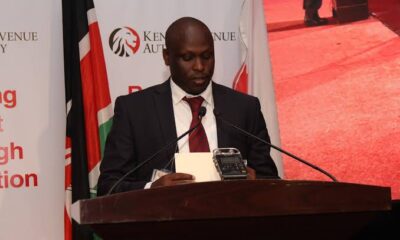

Kenya Revenue Authority partners UK to streamline customs valuation process
The Kenya Revenue Authority (KRA), has struck a partnership with the United Kingdom (UK) to streamline the Customs valuation process...
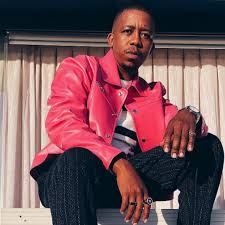

South African actor dies tragically in car accident
South African actor, Mpho Sebeng, has reportedly died in a ghastly car accident in in Potchefstroom, North West province, his...


Chelsea offers Lukaku plus cash to Napoli for Osimhen
English Premier League club, Chelsea, is said to be willing to offer Belgium striker, Romelu Lukaku, as well as fork...
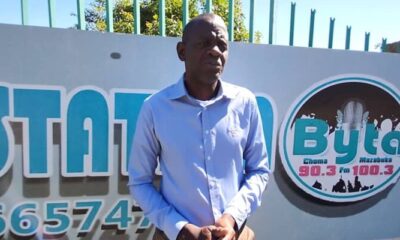

Media manager identifies bureaucratic bottlenecks as hindering access to public information
As discussions on press freedom persist, Albert Mwiinga, Station Manager of Byta FM, sheds light on the hurdles journalists encounter...
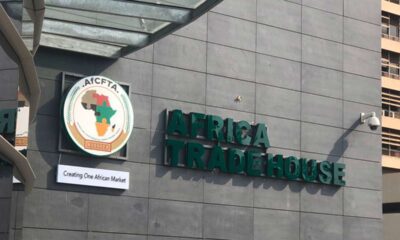

Nigeria: Manufacturers’ market access key to success of AfCFTA agreement
According to the Manufacturers Association of Nigeria (MAN), the ability of local manufacturers to compete on the continent is crucial...
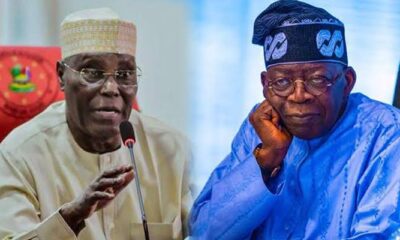

Nigeria: Atiku alleges Tinubu’s son, surrogates on board of firm awarded lucrative coastal highway contract
Former Nigerian Vice President, Atiku Abubakar, has alleged that President Bola Tinubu’s son, Seyi, and his surrogates are on the...
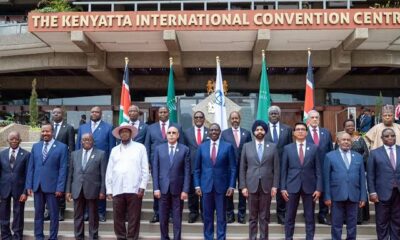

Behind the News: All the backstories to our major news this week
Over the past week, there were many important stories from around the African continent, and we served you some of...


Nigerian retail startup Renda secures $1.9m funding to drive expansion
Nigeria’s retail startup, Renda, has announced securing a $1.9 million pre-seed round of equity and debt funding to enable it...
Trending
-

 Sports22 hours ago
Sports22 hours agoChelsea offers Lukaku plus cash to Napoli for Osimhen
-

 Metro1 day ago
Metro1 day agoNigeria: Atiku alleges Tinubu’s son, surrogates on board of firm awarded lucrative coastal highway contract
-

 VenturesNow1 day ago
VenturesNow1 day agoNigeria: Manufacturers’ market access key to success of AfCFTA agreement
-

 Metro1 day ago
Metro1 day agoMedia manager identifies bureaucratic bottlenecks as hindering access to public information


